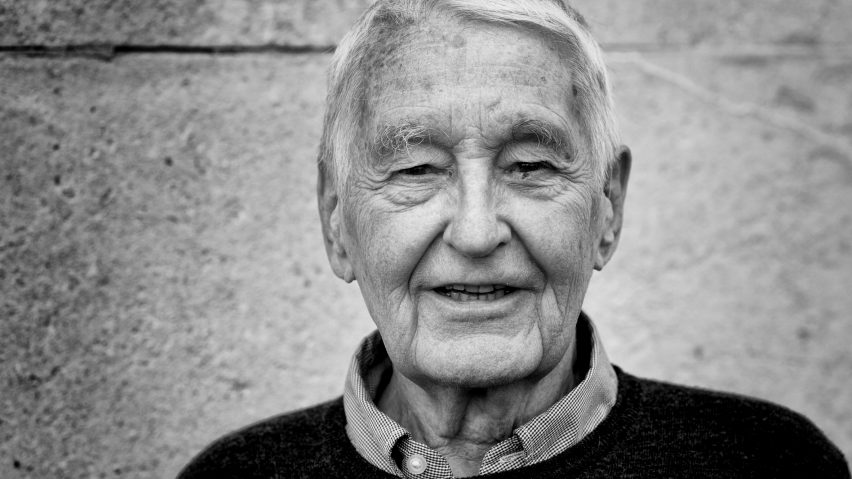
Architects take to Twitter to celebrate "long overdue" RIBA Royal Gold Medal for Neave Brown
Figures on the London creative scene have tweeted their surprise and delight over the news that social-housing pioneer Neave Brown is to receive the RIBA Royal Gold Medal.
Warm tributes flooded the social media network with architect Peter Barber calling Neave a "big hero" and Alex Ely of Mae Architects describing him as "an inspiration and guiding light".
"Really good to see Neave Brown getting recognised," tweeted artist Verity-Jane Keefe, who described the 88-year-old as a "total champ".
Architects O'Donnell + Tuomey said they were "delighted" by the news of Brown's award.
Delighted to see the #RoyalGoldMedal go to Neave Brown, pioneer of public housing! We've fond memories of him showing us Alexandra Rd onsite pic.twitter.com/qbEMsp9ccR
— O'Donnell + Tuomey (@odonnell_tuomey) September 28, 2017
Brown, whose projects include the Alexandra Road Estate in north London, is to receive the RIBA's highest individual honour for his pioneering contribution to social housing in the UK. He is the only living architect to have all of his projects in the UK heritage listed.
Architectural writer and Dezeen columnist Will Wiles tweeted: "Completely delighted by this news. Long overdue. It's impossible to overstate the affection and esteem for Brown within the profession."
Catherine Slessor, former editor of Architectural Review, tweeted simply: "Neave Brown. About time."
"Few architects have been more committed to social housing," said writer and broadcaster Tom Dyckhoff.
"Happy gold medal to you!" tweeted Mirtilli di Lonra, another architect.
GOLDEN BROWN @riba _london big hero Neave Brown and top geezer acknowledged at last with RIBA Gold Medal ...BONZER NEWS
— Peter barber (@PpeterPeter) September 28, 2017
Completed in 1978, the now Grade II* listed Alexandra Road Estate in Camden demonstrated a new model for high density housing without high rise buildings.
Meneesha Kellay, curator of public programmes at RIBA, tweeted that it was "incredibly moving to read pages and pages in support of his nomination by Alexandra Road estate residents".
Brown was a leading light in Camden Council's Architects Department in the 1960s and 70s, which produced some of the most innovative and aesthetically important post-war housing projects.
Yet until this week's Royal Gold Medal announcement, he remained largely undecorated and unknown to the wider public.
Neave Brown. About time. pic.twitter.com/MGCzngHkqi
— Catherine Slessor (@cath_slessor) September 29, 2017
"Couldn't be happier for him. A great man," said Ellis Woodman, director of the Architecture Foundation and architecture critic at the Telegraph.
Woodman shared personal memories of Brown, tweeting stories about how in the 1940s US-born Brown "used to go to New York at the weekend to see Rothko and Pollock [art] shows."
"He came to England when war ended and was sent to a provincial boarding school were he was understandably snooty about the art department," Woodman remembered.
"He did one of the first events in the AF/Barbican programme straight after driving from France with a cat and dog in the car for 10 hours and was up to midnight with us drinking afterwards."
Recently elected RIBA president Ben Derbyshire tweeted a candid shot of Brown's name being carved into the RIBA foyer.
#NeaveBrown's name being carved in the foyer @RIBA. #RoyalGoldMedal a tribute to the best of #Housing #Architecture. pic.twitter.com/KpeYfO8OeU
— Ben Derbyshire PRIBA (@ben_derbyshire) September 29, 2017
As well as the warm wishes and congratulations there was a political undercurrent to the announcement, which comes at a time when the UK's social housing is under huge scrutiny following the Grenfell fire.
In a statement announcing the prize yesterday, Derbyshire said: "The UK must now look back at Neave Brown's housing ideals and his innovative architecture as we strive to solve the great housing crisis."
Architect and writer Douglas Murphy shared a widely circulated image of Brown's Eindhoven project, a low-rise high-density housing complex he designed for the Netherlands in 2002.
"This is what we lost when the UK chased Neave Brown out," he said.
Despite being welcomed at the time, in succeeding decades popular opinion turned against the buildings of the post-war period and the architects who designed them.
Owen Hatherly, author of 'Militant Modernism; A Guide to the New Ruins of Great Britain' , said those in government in the time who failed to support visionary architects such as Brown "should be ashamed of themselves".
"Thing is, this was probably the best housing ever built in Britain, and the people who made it were basically hounded out of the country."
"Neave Brown says he was "traumatised" by the experience for years," said architecture writer Maik Novotny.
"Not surprising, but still shocking to hear."